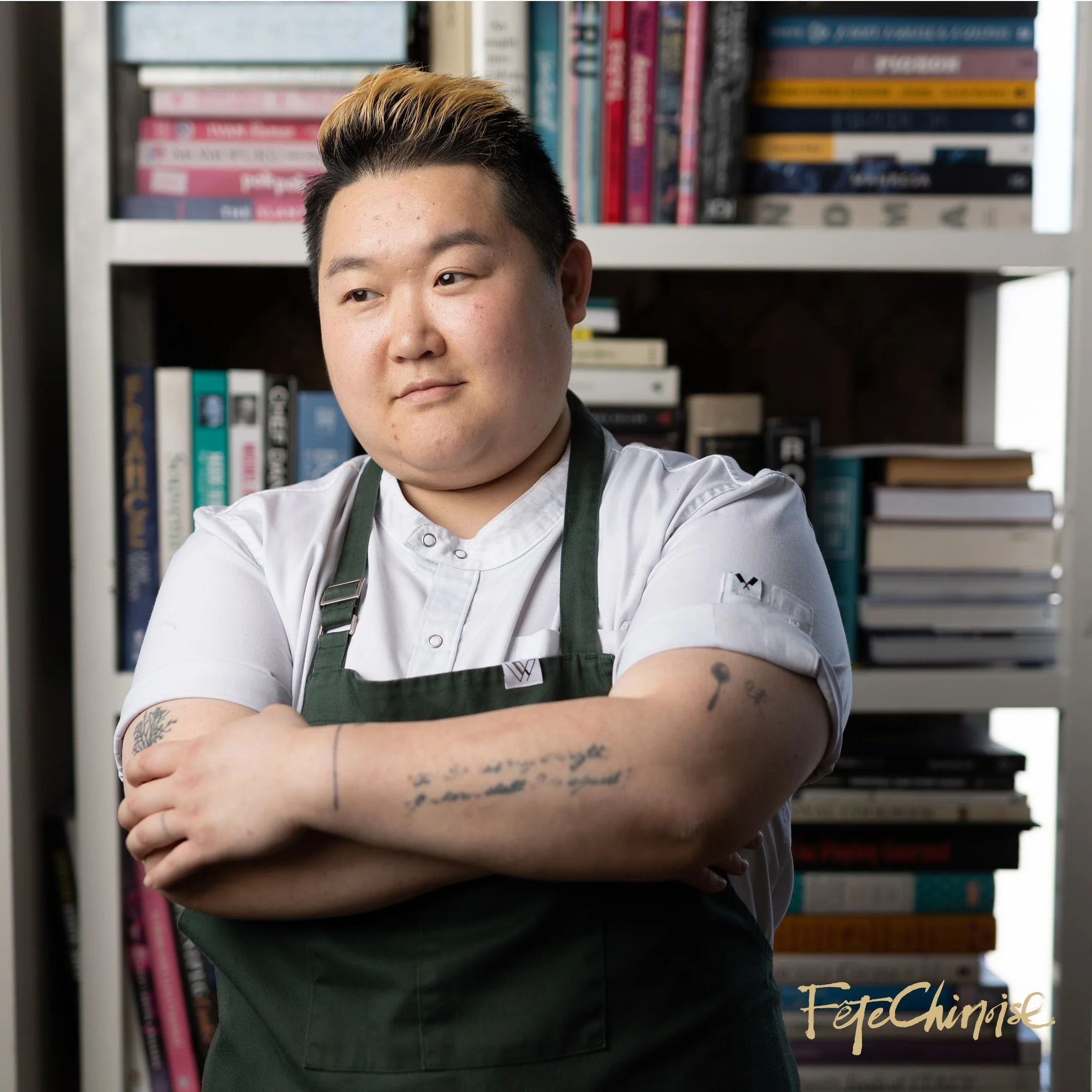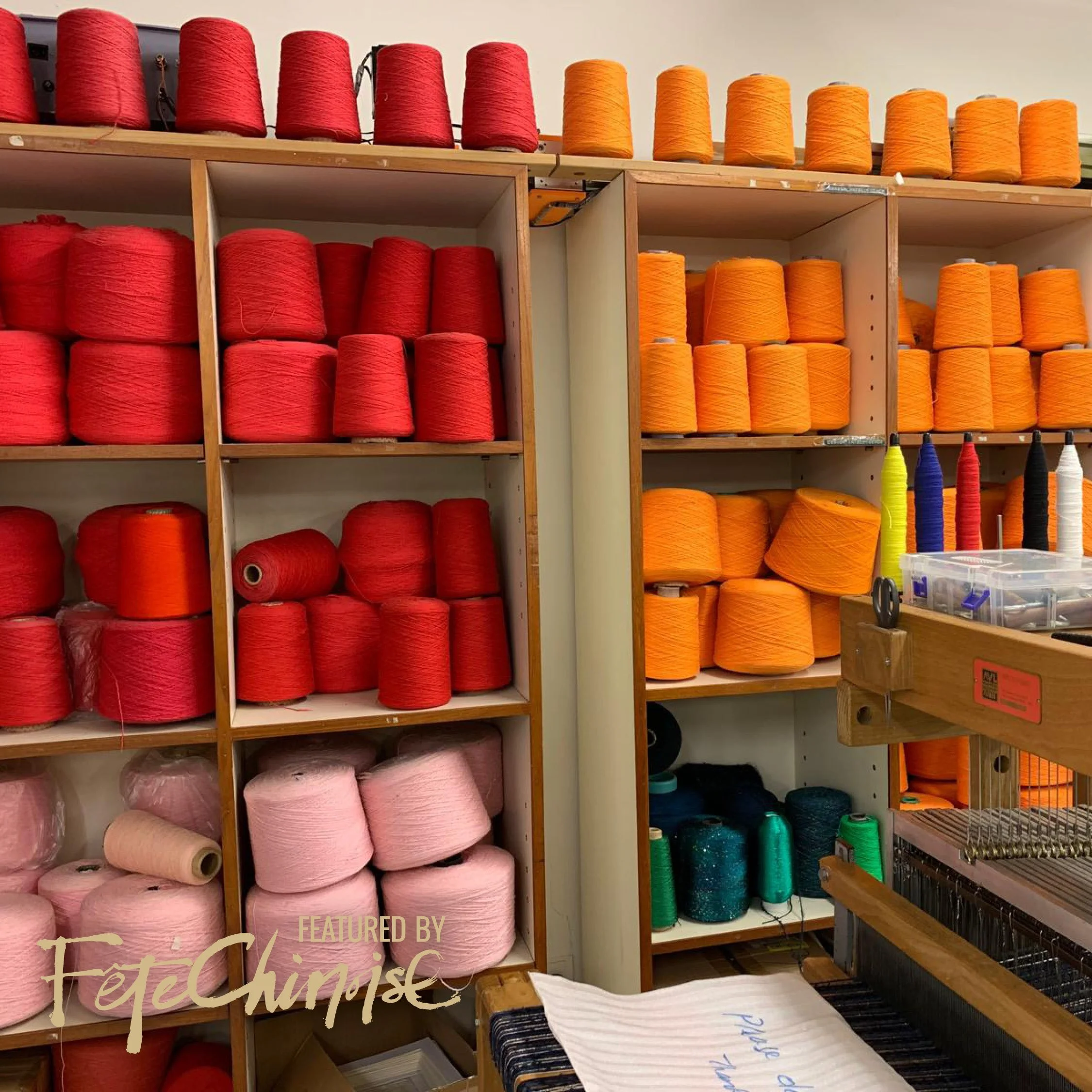Eva Chin: In a Shifting Culinary Landscape 錢樺溶:「味」力
ENGLISH 英 : Renée S. Suen | CHINESE 中 : Christina Li 文禮
VENUE: quell now · ART DIRECTION: DEBORAH LAU-YU · Photography: calvin lee · VIdeographer: Fête Chinoise Team · MAKEUP & HAIR: Satine Yang · Apron: Chef & Co Canada · Office team: Lilian mak, ruizhou li
Born into a family of mixed Asian heritage (her mother is Samoan-Hawaiian, and her father Singaporean-Chinese), Eva Chin was raised on her grandmother’s farm in Kahuku, Hawaii. Growing up, she learned how to harvest vegetables, fish and prepare seafood. She also became familiar with a variety of cuisines and cooking styles, from Thai to Portuguese to Japanese. But becoming a chef wasn’t a given.
Chin studied behavioural science at university, with an objective of eventually entering law school. It was what her family had wanted for her, but Chin wasn’t sure. Taking time off to travel — and figure things out — she fell into cooking to make money while abroad on a tourist visa. Being in the kitchen felt comfortable to her. It recalled experiences and sensations she had as a member of a farming family. She decided then to trace her grandmother’s culinary footsteps in Japan, where she gained insights into the discipline, philosophy and mindfulness of Japanese cuisine. From there, she went to Australia, followed by Europe. Eventually, she found herself in London under the tutelage of British chef Shane Osborn. She now knew what it was she would do in life.
“It was so natural to me that I didn’t even realize I was preparing myself for a career in cooking,” Chin says. “I think it was three years into it in London when I realized, ‘Oh my god, I want to do this.’”
「味」一字,指利用舌頭品嘗或鼻子聞所得的感覺; 亦有品味、研究、體會的意思,字形結構簡單而意義精妙 。對廚師而言,「味」是取悅食客的舌頭與心靈之關鍵。煮出舌尖喜歡的味,是一門統計學,綜合了廚師多年經驗,加上材料、地理、食客口味、經濟學及市場學的數據分析。相對地,烹調觸動人心的味,則是一門心理學,融合廚師的體會、覺悟及說故事的能力,複雜得多。一道令人動心的菜餚,就是一股可以帶給食者溫度、回憶、甚至啟發的「味」力。
全世界從事餐飲人士如恆河沙數,當中能烹調出「味」力料理的廚師少之又少,錢樺溶(Eva Chin)是其中少數之一!Eva是近年世界廚壇受關注的新女廚。這位多倫多Momofuku Kōjin餐廳的前任主廚、新派中菜快閃到會The Soy Luck Club的主理人表示:「食物是愛的共通語言,料理是對文化的致敬。」對!食物不單純為飽腹,料理不只反映潮流;味,也是一份情懷。
As a mentor and leader, Shane was very fair and Chin also found from her experiences that the UK felt more fair compared to other places when it comes to equal treatment between male and female chefs. During her career, Eva experienced a lot of gender discrimination and racial prejudice. "This industry is very difficult, especially for women, ethnic minorities and gay communities. I had to put in extra time and effort to get a chance to be recognized." The catering industry is still dominated by white men, female chefs and head chefs account for only a quarter, and ethnic minorities account for less than a third of chefs and management positions. However, the industry is changing with more talented female and minority chefs taking the lead. Now the door is open to "a new generation who knows how to fight for themselves. When I was an apprentice, I was never daring enough to think about it."
Chin went on to hone her craft in some of the world’s finest kitchens before settling in Vancouver, which she discovered when she missed her flight after attending a friend’s wedding. The Canadian city’s proximity to the sea and mountains reminded her of Hawaii, inspiring her to stay and establish roots. “Canada is special to me,” she says. “Besides the huge Chinese population, there is a different type of warmth and acceptance that I didn’t have in the States. I was shocked to discover that Chinese culture and food is quite celebrated here. It revitalized my palate for Chinese cuisine. It made me want to cook it again.”
這人氣女廚在夏威夷長大,母親有薩摩亞的背景,父親是新加坡和中國混血兒。她從小在大自然、農場、海邊、廚房流連,因此食材成為了Eva最熟悉的朋友。外婆是夏威夷極少數成功的非日裔女壽司師傅之一,從小向Eva灌輸了很多日系烹飪哲學。尚在孩提的Eva,已經被啓發食物是陌生人之間的共同語言,是一種說故事的方式、是找尋自身身份的途徑、是探索種族文化和傳統的渠道。耳濡目染下,她對料理擁有一套獨特見解。Eva的烹飪理念聯繫社區、文化和菜餚 —— 用「味」力講述人與人、人與地之間,動人的故事與暖心的回憶。
Sponsored by Tiffany & Co.
She got the chance in 2014, when she went to Hong Kong to help her mentor open a new restaurant. Hong Kong, she discovered, had organic farms that were able to support the farm-to-table cuisine then being championed by European Michelin-star chefs such as Osborn. Also working in Hong Kong at that time was the Canadian-born Taiwanese chef Jowett Yu, whose then-newly opened Ho Lee Fook restaurant served Chinese cuisine prepared with European cooking techniques. Chin took notice. “These new approaches helped me redefine my perspective of Chinese food and cooking,” Chin says. “They gave me a glimpse of what the future of cooking could be, with both European and Chinese food meeting in the middle.”
Returning to Vancouver, Chin soon made a name for herself at the city’s Royal Dinette restaurant, where she received her first four-star review. She then moved on to Boulevard as chef de cuisine. There, she worked under two Asian chefs (Alex Chen and Roger Ma) who helped to expand her knowledge of Western cuisine with Asian accents.
大學主修心理及行為科學的她,一直以為做研究和寫論文就是她的未來;事實上,投身廚師行列也是無心插柳,當年選擇在廚房工作只為賺取背包旅行的旅費。Eva從未接受過正規餐飲訓練,多年來走遍世界各地,練得一身廚藝。曾在日本、香港、英國Jason Atherton Pollen Street Social、澳洲Brae、挪威米芝蓮三星Maaemo、溫哥華Boulevard Kitchen和Oyster Bar等餐廳工作。Eva將自己的烹飪風格和成就歸功於她師傅,米芝蓮名廚Shane Osborn。問她會用哪道菜式答謝師傅啟蒙之恩?她思索了一陣子,想出一味「醉雞配酸種麵包」,Eva憶述:「師傅是一個我十分尊重的人,能加入他的團隊是我的幸運,我十分期望他會為我自豪。因此給予自己無比的壓力,更沒有時間參透廚師專業的真締。師傅用簡單難精的酸種麵包令我明白到廚師對食物的堅持、對食客的責任。另外,師傅當年的首本名菜:醉鴿,令我了解烹飪無國界的理念。」她坦言,多年來的尋尋覓覓、起起跌跌,曾經令自己迷惘、氣餒,她感恩身邊的貴人,尤其是妻子令她找回那一度失去的動力及廚師的初心,重新領悟出用「味」力講故事的精髓。
職業生涯中,Eva經歷過不少性別歧視及種族偏見:「這行業非常艱辛,入行之初,日出而作日入而息,忙到透不過氣,尤其是女性、少數民族及同志社群,我必須付出加倍的時間及努力,才有機會得到認同。」 餐飲行業仍是由白人男性主導,女性廚師和主廚人只佔四分之一,少數族裔佔主廚及管理職位比例不到三份之一。然而,隨着越來越多的業內人士和消費者發聲,要求廚師和餐廳正視這議題,行業正在不斷變革,更多才華橫溢的女性和少數族裔廚師獨當一面。現在門户現已打開,「新一代懂得為自己而爭取。當我還是學徒的時候,從未夠膽有這個想法。」
chaoshan drunken cherrystone clam with lovage and aged soy
bc spot prawn supreme soup dumpling
From there, she was recruited to Toronto’s Momofuku Kōjin, where she was appointed chef de cuisine at her first all Asian-themed restaurant. Next up was Avling Kitchen where, as executive chef, she cooked dishes recalled from her childhood, such as shrimp toast and drunken chicken. She’s revamping in the hope they’ll spark increased curiosity about Asian cuisine in the general populace. It’s a goal she’s now pursuing full time as the founding chef of Soy Luck Club, a popular Toronto pop-up known for putting inventive but cheeky twists on classic Asian dishes for all. “I want to cook food that’s nostalgic,” Chin says. “But I also want to bring together different communities through different types of thoughtfully made food.”
For Chin, it’s just the tip of the iceberg.
精通歐洲和新美國菜系的Eva,多年來一直遠離亞洲菜餚,甚至沒有把自己文化、家鄉的風味融入烹飪當中。新冠大流行期間,反亞裔仇恨充斥不斷,Eva認為有需要凝聚這一代的有心人,一起創造不一樣的勢力,傳承祖先的故事,修補一直以來的文化鴻溝。
“I really want to push the envelope,” she continues, “and dig deeper into the cuisine being made in places like Hong Kong, where Chinese food tends to be more adventurous than what we usually get in Canada.”
Hawaiian sweet milk rolls with passion fruit butter and white kiawe honey
To that end, Chin is now working toward finding business partners who could help her build Soy Luck Club into a more permanent, multi-pronged venture. “I want a place where I can finally put cuisine, culture and community all in one room, and include different projects like a restaurant, a bakery, a Chinese deli. My next career focus is to celebrate my own community.”
「用心做飯對我來說從來沒有像現在這樣重要。」她說: 「我需要藉烹飪建立自身聯繫,透過味道尋根、了解更多我的亞裔傳統。」作為八十後,Eva明瞭她這一代人兼負傳承的責任,令後生一輩或其他種族藉飲食懂得欣賞我們的文化, 挑戰亞洲菜餚在北美州的刻板印象。她正積極研究亞洲料理歷史以及古老食譜,利用現代手法、在地特色食材演譯融合傳統與新意的新派亞洲菜,令饕客們無法忘懷!
什麼是「她」力量?那是女性獨有的力量,始於自我探問:我是誰?我該何去何從?我要採取甚麼行動成為更好的自己,成就更好的未來?感謝錢樺溶,這位飲食界女性新勢力,為亞洲菜系注入新力量,在北美州展現新世代的無窮「味」力!

























Lesley Chiang's career trajectory reflects her diverse talents and multicultural background. Born in Hong Kong and raised in Vancouver, this Canadian actress and singer-songwriter has made waves in both the music and film industries while becoming a vocal advocate for mental health awareness.
“I grew up in Vancouver, and it's always such a big part of me and it's something I'm really proud of to be Chinese Canadian,” she says. This multicultural upbringing provided her with a unique perspective that infuses her work.